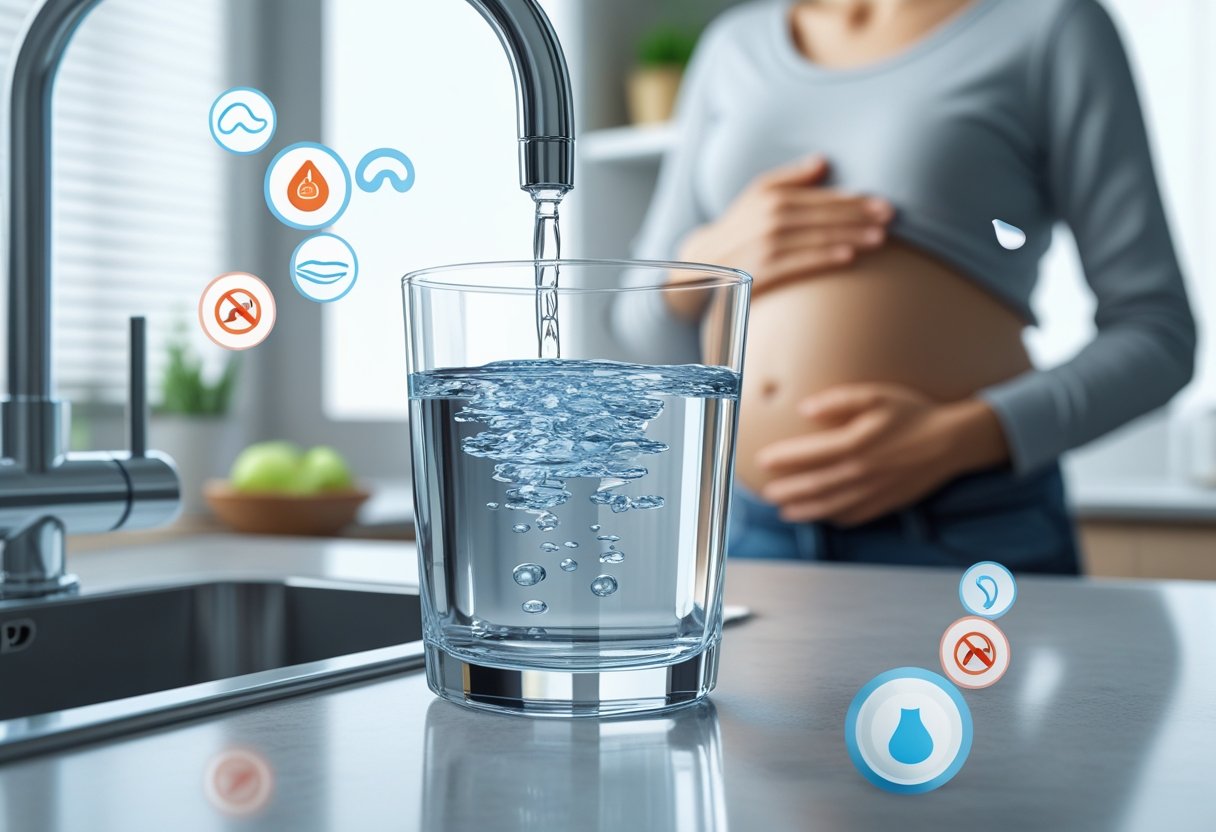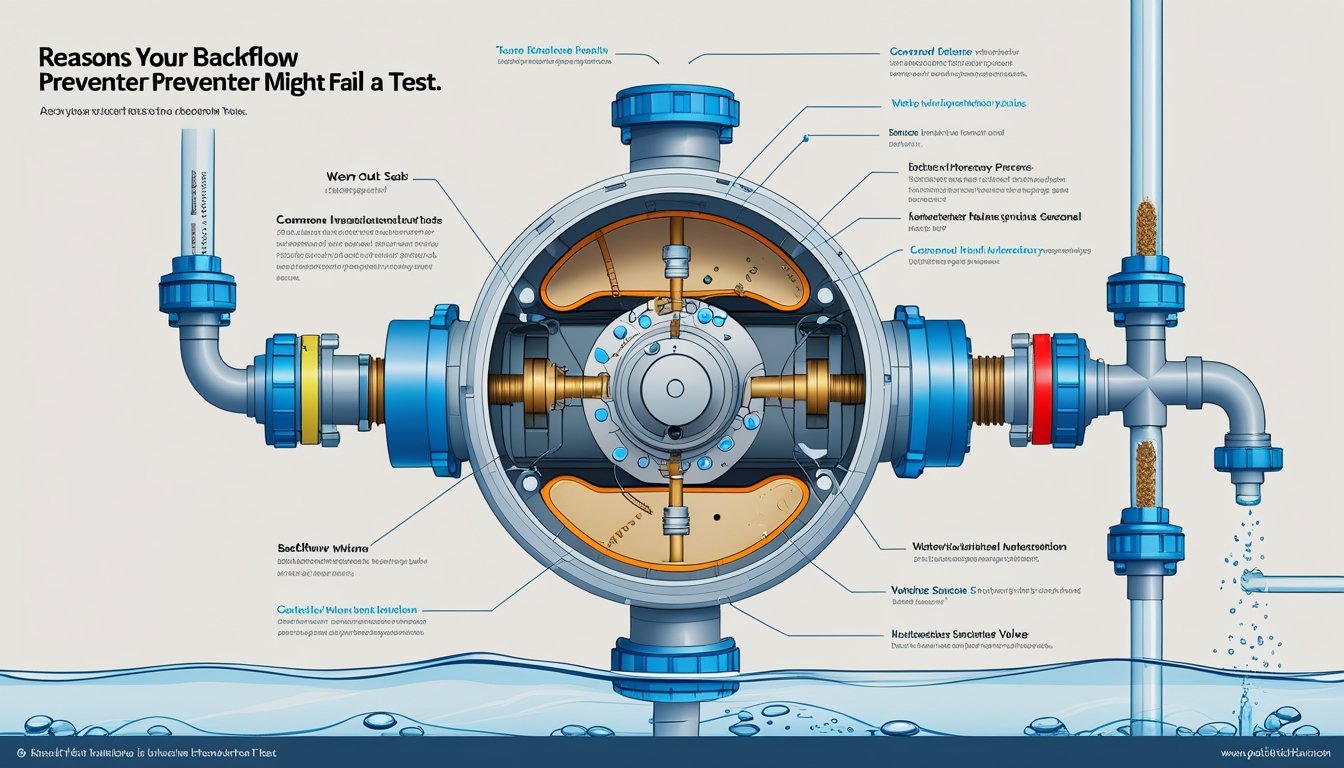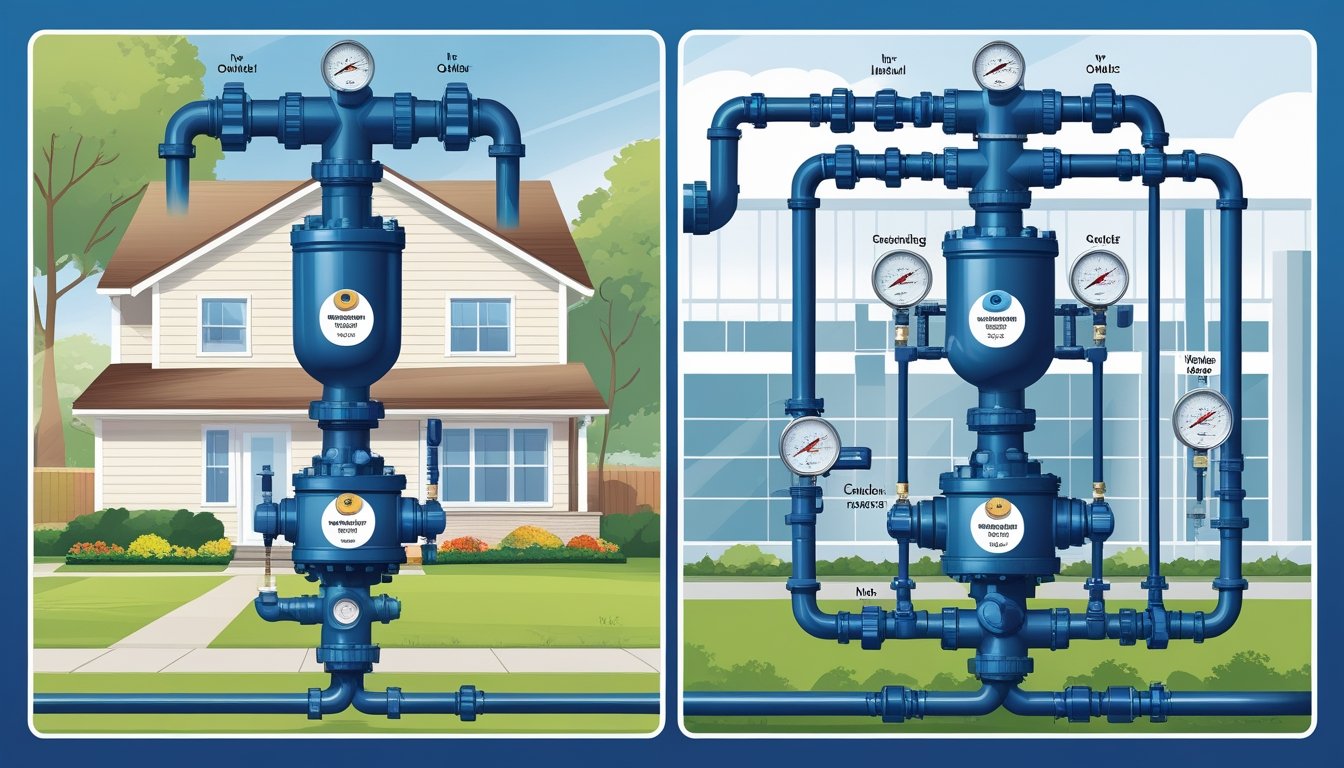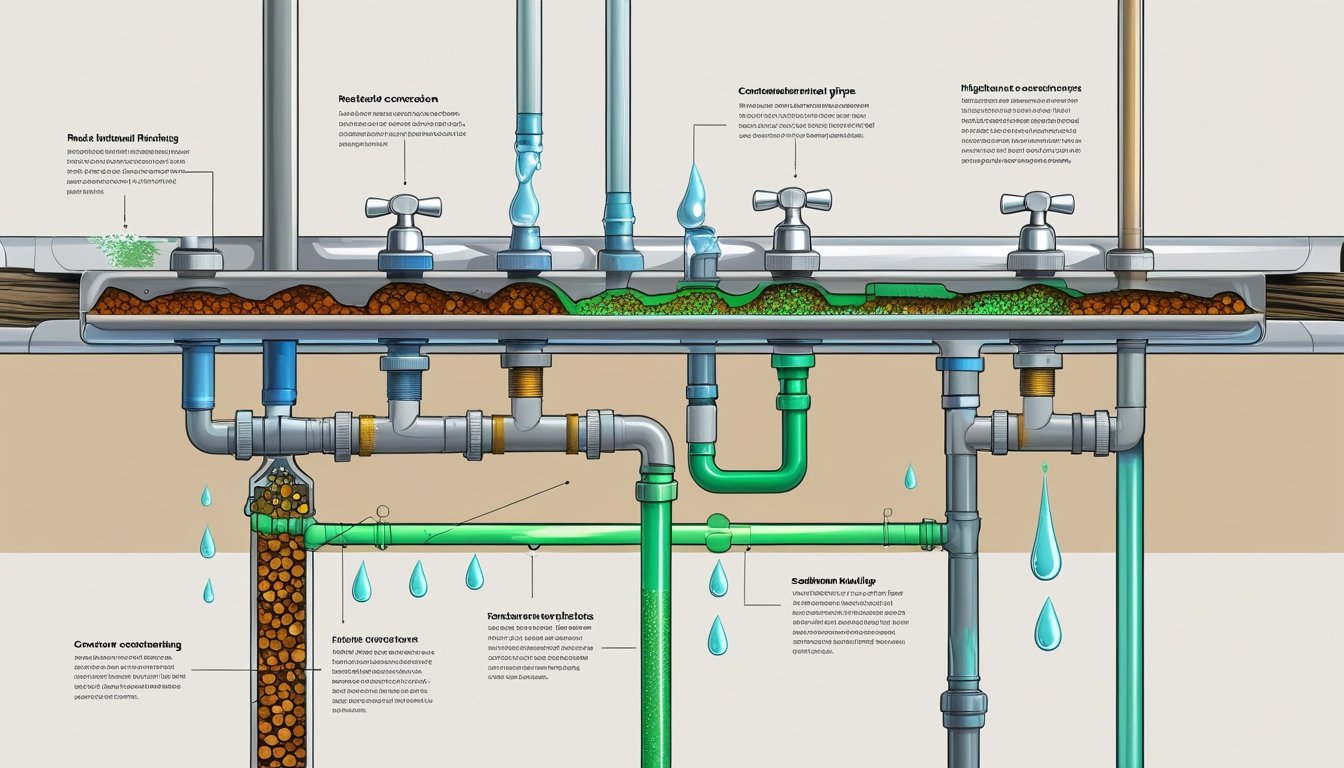When it comes to drinking water, many people assume tap water is always safe. Tap water can indeed cause stomach issues, especially if it’s contaminated or improperly treated. Factors like high levels of chlorine, bacteria, and heavy metals can lead to gastrointestinal discomfort. It’s essential to be aware of the quality of your local water supply.
If you find yourself consistently experiencing stomach pain after drinking tap water, you may want to investigate the potential causes. Some people may react negatively to cold water, while others could have underlying digestive conditions that are exacerbated by drinking water. At Pacific Backflow, we understand the importance of safe drinking water and offer comprehensive backflow testing services that help ensure your water supply remains uncontaminated.
By taking proactive measures, such as regular backflow testing, you can protect your health from potential waterborne illnesses. Serving all of San Diego County, Pacific Backflow is committed to ensuring that your water supply is well-maintained and safe for consumption.
How Tap Water Quality Relates to Stomach Issues
Water quality is crucial in determining whether your tap water might cause digestive problems. Contaminants in the water supply can lead to symptoms such as abdominal discomfort and other gastrointestinal issues. Understanding these factors empowers you to make informed decisions about your drinking water.
Overview of Water Quality Concerns
The quality of tap water can vary significantly based on geographical location, source, and treatment processes. Municipal water systems often face challenges like aging infrastructure and contamination by pollutants. This can lead to water quality issues that might harm your health.
Inadequately treated water can harbor pathogens and chemical contaminants. Regular testing and monitoring by local water authorities help ensure compliance with public health standards, but occasional lapses can occur.
You should stay informed about your water supply and consider additional filtration methods if necessary. Understanding the specifics of your local water quality can help you minimize risks associated with drinking tap water.
Understanding Digestive Symptoms from Tap Water
Drinking contaminated tap water can trigger a range of digestive symptoms. Issues may include abdominal pain, cramping, and nausea. People with pre-existing conditions, such as gastritis or irritable bowel syndrome, may experience intensified symptoms from poor-quality water.
The stomach's delicate balance can be disrupted by changes in pH levels caused by certain contaminants. This disruption can lead to discomfort after consumption. Staying hydrated is essential, but knowing what you're drinking is equally important for maintaining digestive health.
If you frequently experience stomach issues related to tap water, consulting your healthcare provider might be beneficial. They can offer insights and recommendations tailored to your unique situation.
Key Contaminants Impacting the Digestive System
Several contaminants found in tap water can impact your digestive health. Common offenders include:
- Microbial Contaminants: Bacteria, viruses, and parasites that can lead to gastrointestinal illnesses.
- Chemical Contaminants: Heavy metals like lead and arsenic can contribute to long-term health issues.
- Pesticides and Herbicides: Runoff can introduce harmful chemicals that affect intestinal flora.
In rare cases, the presence of certain minerals in hard water may also result in discomfort. Knowing what’s in your tap water allows you to take proactive steps in ensuring your digestive well-being.
For reliable and responsive water quality solutions, consider reaching out to organizations like Pacific Backflow. They are committed to protecting the water supply across San Diego County, ensuring your drinking water meets safety standards.
Common Contaminants in Tap Water and Their Effects on the Stomach
Contaminants in tap water can significantly impact your health, particularly your digestive system. Various substances can lead to gastrointestinal issues, skin irritations, and other health risks. Understanding these contaminants will help you make informed decisions about your drinking water.
Bacteria and Microbial Agents
Bacteria such as E. coli and Salmonella can contaminate tap water, leading to severe stomach issues. These microorganisms often originate from fecal matter and can cause gastrointestinal disorders, including diarrhea, vomiting, and cramps. Symptoms may appear within hours or days after consuming contaminated water. Maintaining proper sanitation practices and ensuring water quality can reduce these risks. Regular testing of water supplies, as performed by companies like Pacific Backflow, is essential for identifying harmful bacteria. By doing so, you can better safeguard your health and that of your family.
Heavy Metals in Water
Contaminants like lead, mercury, and arsenic can leach into drinking water from industrial pollution, aging pipes, or natural deposits. These heavy metals can have serious health effects, contributing to stomach pain, nausea, and even long-term organ damage. Lead exposure is especially harmful for children, affecting both cognitive and physical development. Regular testing for heavy metals in water is crucial for early detection. Pacific Backflow can assist in ensuring your water system is free from toxic substances through thorough backflow testing and preventive measures.
Chemical Additives and Byproducts
Common chemical additives, such as chlorine and chloramine, are used to disinfect water but can produce byproducts that might affect your stomach. These byproducts, such as trihalomethanes, can cause digestive discomfort and have been linked to other health issues with prolonged exposure. Moreover, pesticides and industrial chemicals can enter your water supply, leading to additional negative health impacts. Understanding the potential risks of these additives helps you evaluate the quality of your tap water. Testing by professionals can identify harmful levels and inform necessary actions.
Parasites and Protozoa
Parasites like Giardia and Cryptosporidium can contaminate drinking water and result in stomach ailments such as diarrhea and cramping. Giardia is often linked to contaminated water from outdoor sources, while Cryptosporidium can survive in chlorinated water systems, making it particularly challenging to eliminate. Infection can lead to dehydration and other health complications. By ensuring regular inspections of your water supply, such as those offered by Pacific Backflow, you can help protect your household from these harmful parasites. Taking preventive measures is crucial for maintaining clean and safe drinking water.
Tap Water-Linked Digestive Symptoms and Medical Conditions
Your tap water can potentially lead to various digestive symptoms and medical conditions. Understanding these issues can help you identify if your water source may be contributing to discomfort or illness.
Stomach Pain and Abdominal Discomfort
Drinking tap water that is contaminated or contains certain minerals can lead to stomach pain and abdominal discomfort. Symptoms may manifest as sharp or cramping sensations in the stomach area. These pains can arise from various sources, including chemical contaminants, bacteria, or simply the temperature of the water.
If you've recently switched to a new water supplier or notice an odd taste, pay attention. Abdominal discomfort linked to water quality can also be exacerbated by existing conditions like gastroesophageal reflux disease (GERD), leading to further gastrointestinal problems.
Stomach Cramps and Aches
Ingesting tap water that contains pollutants or excessive chlorine can cause stomach cramps and aches. Such symptoms often result from reactions to contaminants that may irritate the digestive tract. This irritation can lead to feelings of nausea, bloating, and digestive distress.
Stress also plays a role; if you're anxious about water quality, this can contribute to your symptoms. If you frequently experience stomach cramps, consider monitoring your water supply. Ensuring your water is safe helps reduce these painful episodes, allowing you to feel better overall.
Inflammation and Gastrointestinal Disorders
Contaminated tap water can lead to inflammation and other gastrointestinal disorders. Long-term exposure to harmful substances may increase the risk of chronic conditions such as inflammatory bowel disease (IBD). Symptoms might include persistent abdominal pain, diarrhea, or weight loss.
It's essential to be proactive in maintaining water quality. Tools like backflow prevention systems, offered by Pacific Backflow, ensure that your water remains uncontaminated. Regular testing can catch issues before they escalate, safeguarding your health and well-being.
By paying close attention to how your body responds to tap water, you can better navigate potential digestive issues linked to your water supply.
Risk Factors That Influence Water-Related Stomach Issues
Various factors can contribute to stomach issues related to water consumption. It's essential to consider aspects such as temperature, water hardness, hydration habits, and individual health conditions that may affect how your body reacts to water intake.
Role of Water Temperature and Consumption Habits
The temperature of the water you consume can influence gastrointestinal comfort. Drinking water that is too cold may lead to stomach cramps or discomfort for some individuals. Similarly, hot water can irritate sensitive stomachs.
Your consumption habits play a significant role as well. Drinking large quantities of water rapidly can cause bloating and digestive distress. It is often recommended to sip water slowly, especially if you have a sensitive stomach or underlying digestive conditions.
Adjusting water temperature and pacing your intake may help mitigate these issues.
The Impact of Hard Water
Hard water contains high levels of minerals like calcium and magnesium. While it is generally safe to drink, some people may experience gastrointestinal discomfort after consumption. The presence of these minerals can cause digestive issues due to mineral overload or difficulty digesting residual compounds.
If you notice consistent stomach issues, consider analyzing your water supply. A water hardness test can determine if the mineral content is excessively high. In such cases, utilizing a water softener may reduce discomfort.
Hyponatremia from Over-Consumption
Hyponatremia occurs when sodium levels in the blood become dangerously low, often due to excessive water intake. Symptoms may include fatigue, nausea, and even confusion. If you're consuming large amounts of water without balanced electrolytes, you are at risk.
Pay attention to your hydration levels, especially during intense physical activities. Aim for moderation to avoid overconsumption. If you experience symptoms after drinking water, consider adjusting your water intake and integrating electrolyte-rich foods.
Medication and Immune System Sensitivity
Certain medications can lead to increased sensitivity to water consumption. For example, diuretics may raise your need for hydration but can also lead to stomach discomfort. If you're on medications, be conscious of how your body reacts after you drink.
Moreover, if you have an autoimmune condition or a weakened immune system, your digestive system may react adversely to various substances in tap water, including chlorine or other chemicals. If you suspect that your medication is influencing your water tolerance, consult your healthcare provider.
Maintaining awareness of how medications affect you can help manage any stomach-related issues stemming from water consumption.
Long-Term Health Effects and Prevention Strategies
The quality of tap water can significantly impact your long-term health. Understanding potential chronic diseases linked to tap water, the differences between various water sources, and practical safe drinking practices is essential for maintaining your well-being.
Potential Chronic Diseases Linked to Tap Water
Exposure to contaminants in tap water can lead to several chronic health issues. Drinking water with high levels of lead and arsenic is associated with conditions like cardiovascular disease and various types of cancer. These contaminants may enter the water supply from aging infrastructure or environmental sources.
Regular testing is vital to identify harmful substances in your water. A study hints at a connection between water quality and gastrointestinal diseases, indicating that tap water can contribute to long-term health problems. Ensuring your water supply is safe can help you avoid these serious risks.
Comparing Tap Water, Bottled Water, and Filtered Water
When considering water options, tap water, bottled water, and filtered water each have unique attributes. Tap water is often more affordable and readily available but may contain contaminants that impact health.
Bottled water is convenient but can be costly and sometimes lacks the rigorous safety standards of municipal supplies. Filtered water offers a middle ground, providing the potential to remove unwanted contaminants based on the type of filtration system used.
Investing in a reliable filtration system can improve water quality significantly. For optimal protection, consider regular backflow testing by Pacific Backflow to maintain a safe drinking environment.
Safe Drinking Practices and Public Health Measures
Implementing safe drinking practices is crucial for minimizing potential health risks. Always ensure that your plumbing is up-to-date and functions correctly to prevent contamination.
Participating in public health initiatives can also help educate communities about the importance of clean water. Supporting regular water quality testing can keep your environment healthy and safe.
Additionally, consider installing a filtration system to reduce contaminants effectively. Utilizing services like Pacific Backflow for backflow testing ensures your water supply remains uncontaminated and compliant with health standards.
Frequently Asked Questions
There are several reasons why you might experience stomach issues after drinking water. Understanding these factors can help you navigate discomfort you may feel and identify appropriate responses.
What might cause immediate stomach pain after consuming water?
Immediate stomach pain after drinking water can stem from various factors including the temperature of the water or the rate of consumption. Cold water may induce spasms in some individuals, while gulping water too quickly can result in air swallowing, leading to discomfort.
How could drinking water lead to upper stomach discomfort?
Upper stomach discomfort can often arise from the overexpansion of the stomach. This may occur when large quantities of water are consumed in a short time, possibly putting pressure on surrounding organs. If you have pre-existing conditions, like gastritis, this can amplify the discomfort you feel.
Is it normal for my lower abdomen to hurt after I drink water?
Lower abdominal pain after drinking water is not typical and may indicate an underlying issue. It could be related to your body's reaction to hydration, especially if there are digestive problems or conditions affecting your intestines. If this pain persists, consulting with a healthcare professional is advised.
Are there methods to alleviate stomach pain caused by excessive water intake?
To alleviate stomach pain, consider drinking smaller amounts of water more frequently instead of large quantities at once. Additionally, taking your time when hydrating and ensuring the water is at a comfortable temperature can help minimize discomfort. If necessary, lying down for a short while might provide relief.
Why might there be stomach pain after hydrating on an empty stomach?
Drinking water on an empty stomach can trigger stomach pain for some people, particularly due to the sudden influx of liquid. Our stomachs may react by producing more gastric acid, which can cause irritation or discomfort. Also, a sensitive stomach can respond negatively to rapid hydration.
Can drinking water lead to stomach pain followed by diarrhea?
Yes, drinking contaminated water can cause stomach pain and may lead to diarrhea. Pathogens or impurities in the water can disrupt your digestive system, resulting in both symptoms. It is crucial to ensure that your water supply is tested and compliant with safety standards to protect your health, which is part of what we do at Pacific Backflow.











